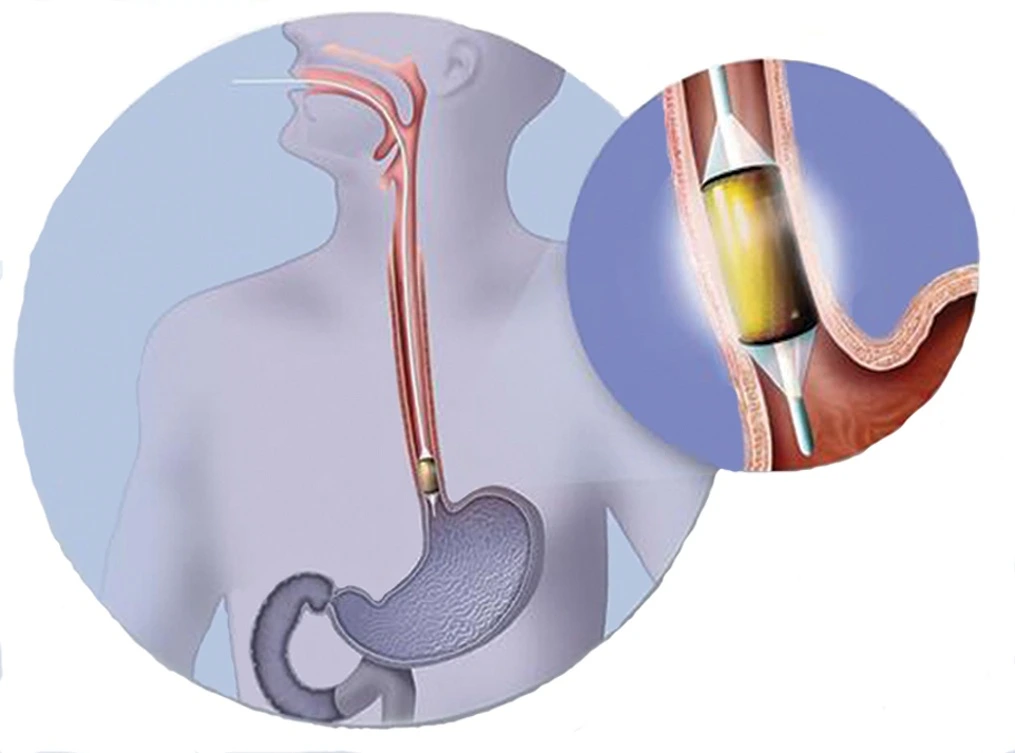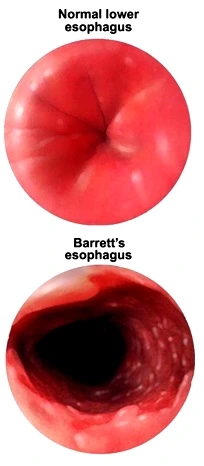
Barrett's esophagus
Barrett's esophagus is a medical condition in which the tissue lining the lower part of the esophagus, the tube that connects the mouth to the stomach, is replaced by tissue that is similar to that found in the lining of the intestine. This change in tissue is caused by long-term exposure to acid reflux, which can irritate and damage the normal lining of the esophagus.
Symptoms
Barrett's esophagus itself may not cause any noticeable symptoms, but it is often associated with gastroesophageal reflux disease (GERD), which can cause symptoms such as:
- Frequent heartburn or acid reflux
- Difficulty swallowing (dysphagia)
- Chest pain or discomfort
- Regurgitation of food or acid
- Nausea or vomiting
- Hoarseness or chronic cough
- Unintentional weight loss
Causes
GERD occurs when the muscle that separates the esophagus from the stomach (the lower esophageal sphincter) relaxes and allows stomach acid and other digestive fluids to flow back into the esophagus. Over time, this acid exposure can cause changes in the lining of the esophagus, leading to the development of Barrett's esophagus.

Diagnosis & Treatment
Diagnosis of Barrett's esophagus usually involves an endoscopy, which is a procedure in which a flexible tube with a light and camera is inserted into the esophagus to examine the lining. During the endoscopy, a biopsy (a small tissue sample) of the lining of the esophagus is taken to determine whether there are any abnormal changes.
If you are diagnosed with Barrett's esophagus, you will likely be recommended regular follow-up endoscopies to monitor the progression of the condition and check for any signs of cancer.
Treatment options for Barrett's esophagus may include:
- Medications to reduce acid reflux: Proton pump inhibitors (PPIs) are commonly used to reduce the amount of acid produced by the stomach and prevent reflux.
- Lifestyle changes: Avoiding foods that trigger reflux, losing weight, and avoiding smoking and alcohol can help reduce the severity of symptoms.
- Endoscopic treatment: Endoscopic therapies, such as radiofrequency ablation or cryotherapy, can be used to destroy the abnormal tissue in the esophagus.
- Surgery: In some cases, surgery may be recommended to remove the affected tissue in the esophagus.
What to expect after treatment
In general, people with Barrett's esophagus who receive appropriate treatment and follow-up care have a good prognosis. After treatment, you can expect to undergo regular follow-up endoscopies to monitor the progress of the condition and check for any signs of cancer. Your healthcare provider may also recommend lifestyle changes, such as avoiding trigger foods, losing weight, and quitting smoking, to help prevent reflux and reduce the risk of complications.
If you undergo endoscopic treatment or surgery, you may experience some temporary side effects, such as sore throat, difficulty swallowing, and abdominal pain. These side effects typically resolve within a few days to a week after the procedure.

